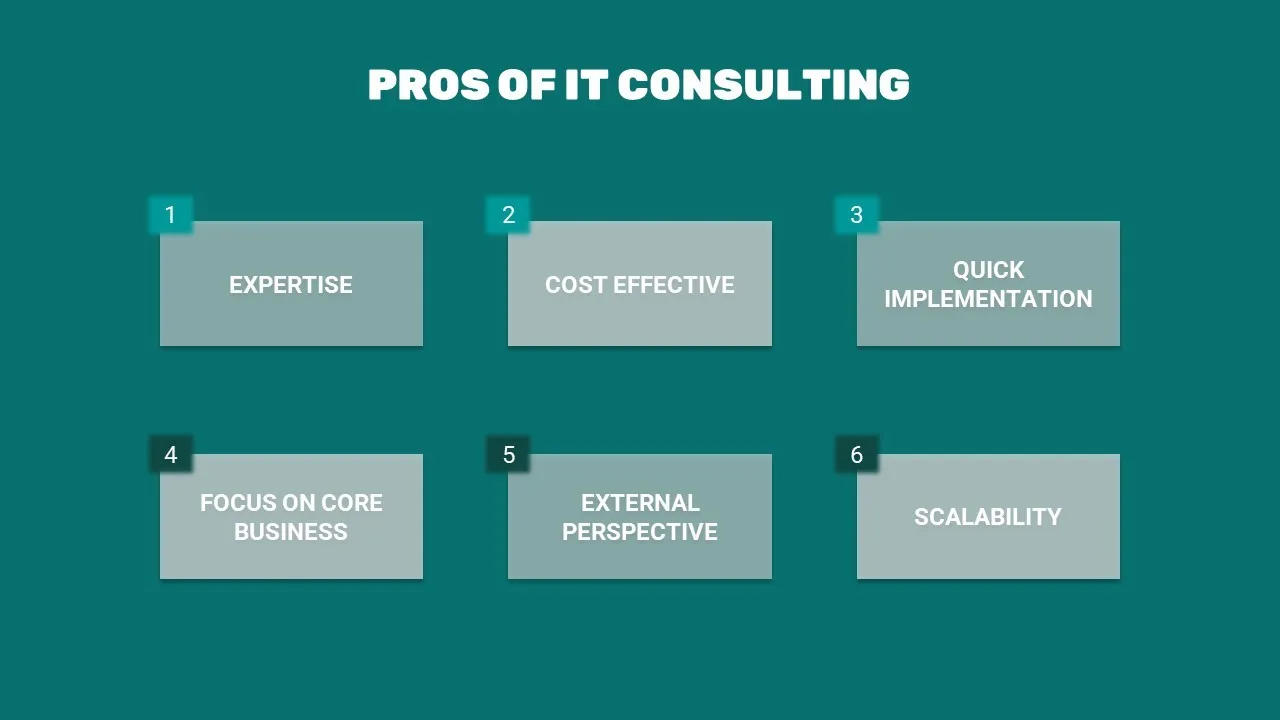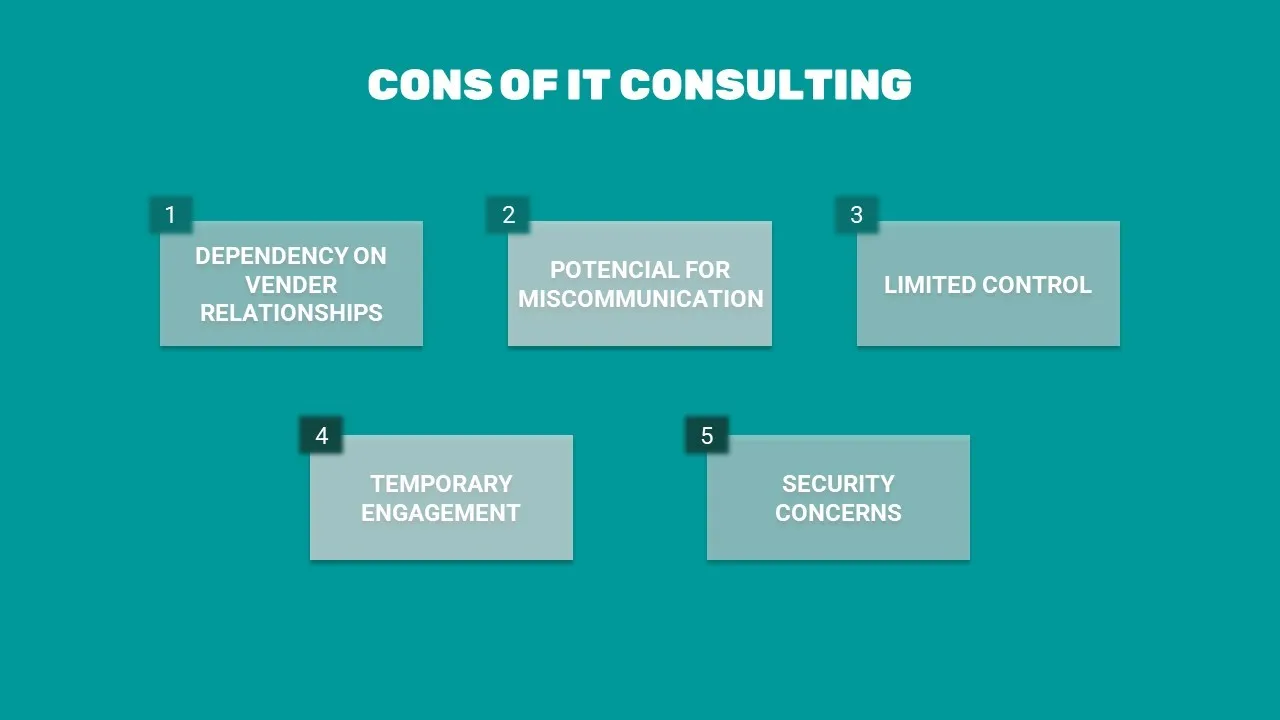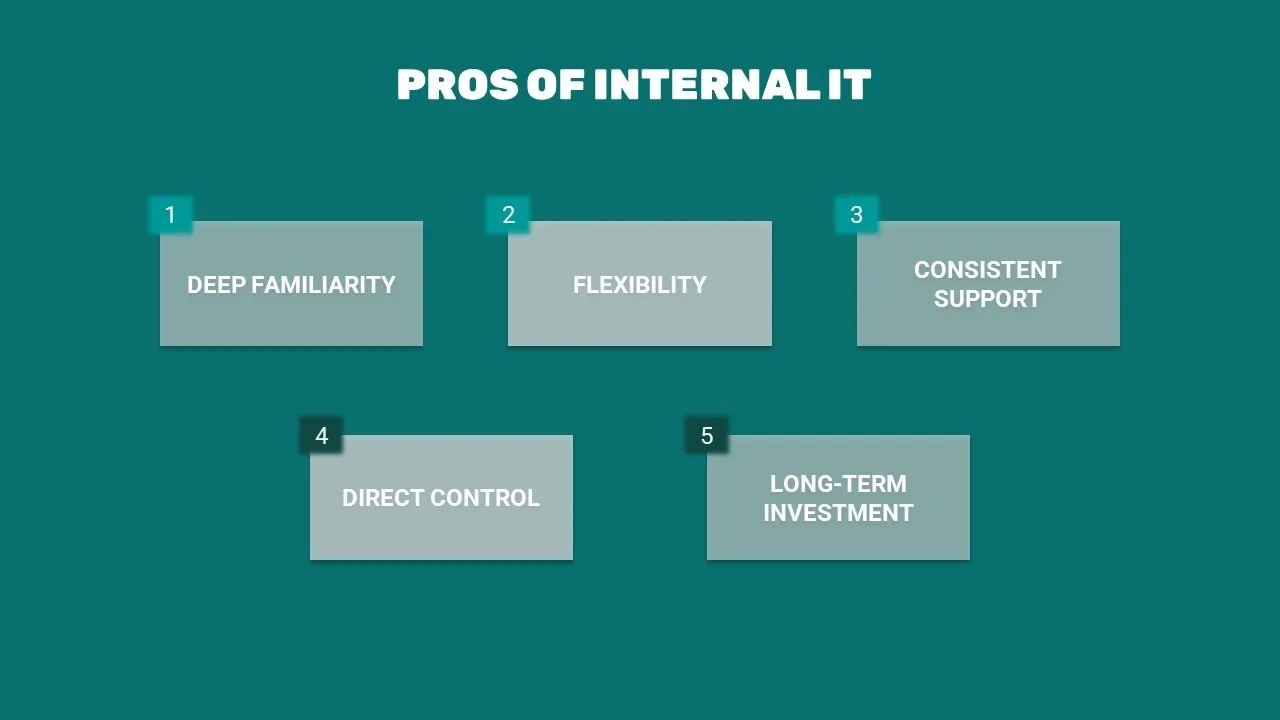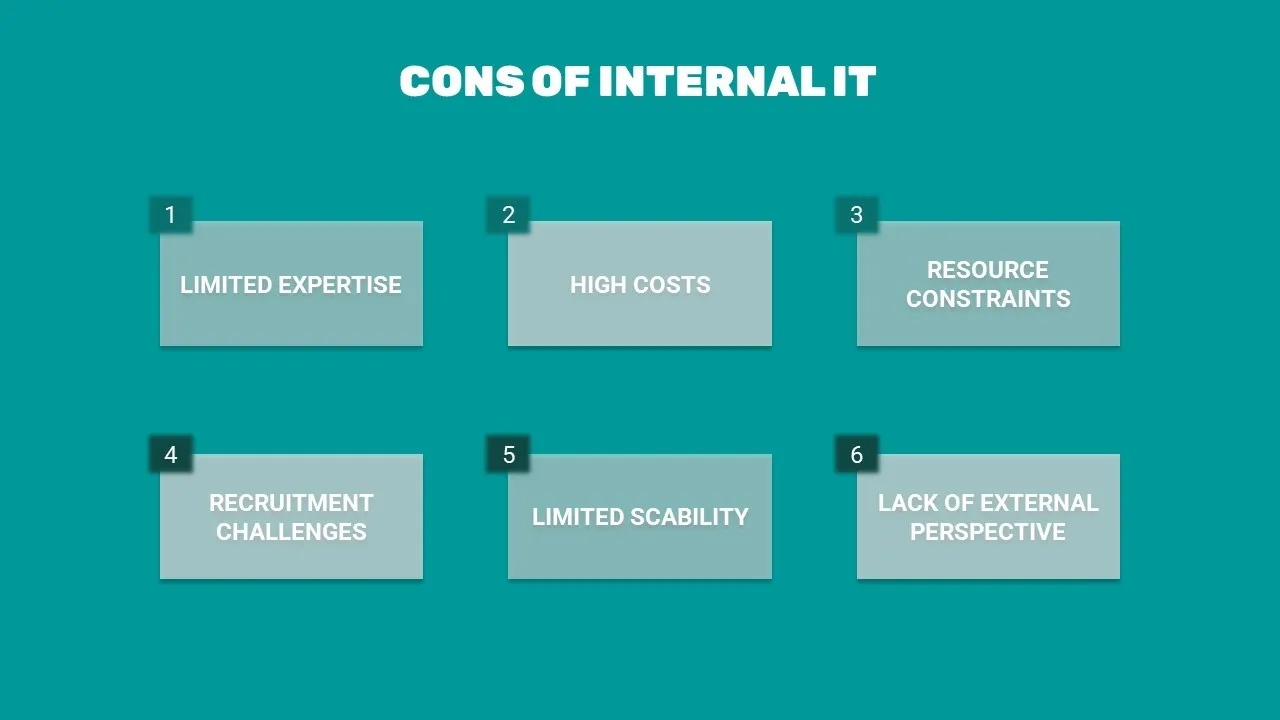Introduction
In our digital age, where technology is the backbone of business, the choice between IT Consulting or Internal IT team can be essential to the success of your business. In this article, we’ll explore the advantages and disadvantages of IT Consulting and Internal IT, assisting you in making an informed decision that best suits your business objectives.
IT Consulting – What is it?
IT Consulting Companies specialize in offering expertise to help businesses develop and execute effective IT strategies. They provide high-level solutions to organizations problems like: advising on the selection of suitable software or systems, optimizing IT infrastructure for maximum efficiency, creating plans to align IT growth with long-term business goals, and implementing cost-saving measures for ongoing IT expenses like maintenance, installations, and software licenses.
Pros Of IT Consulting

Expertise: Consulting companies have people who work daily in the market, constantly updating and training themselves in order to be updated with the latest innovations and technologies. Their skills allow them to advise and help business owners to make the best decisions for their business. This high level of expertise does not always exist in internal teams.
Cost Effective: Hiring IT consultants instead of hiring a full-time IT staff can help to reduce costs, especially for small and medium-sized businesses. They do not have to take care of all the necessary infrastructure, including hardware, software, and office space. Beside that you can engage services on a project-by-project basis, reducing long-term expenses.
Quick Implementation: Consultants often have experience with similar projects and can implement solutions more rapidly than an internal team starting from scratch.
Focus on Core Business: By outsourcing IT projects to consultants, businesses can concentrate on their core activities without being concerned about IT-related issues.
External Perspective: Consultants bring an external perspective, introducing innovative solutions and best practices that might not be apparent from within the organization.
Scalability: Scaling resources up or down based on project demands becomes simpler, without the extended commitment tied to hiring more full-time staff.
Cons Of IT Consulting

Dependency on Vendor Relationships: IT consultants often work with specific vendors or technology providers. While this can bring expertise, it may also lead to delays, dependencies, and potential conflicts of interest.
Potential for Miscommunication: A lack of clear communication or understanding between the IT consultant and the business can lead to misalignment and inefficiencies.
Limited Control: Because IT consultants are external contractors, businesses might have restricted control over their activities, priorities, and decision-making processes.
Temporary Engagement: Consultants are usually hired for specific projects or limited periods, which can lead to a lack of ongoing support and continuity.
Security Concerns: Sharing sensitive business information with external consultants may present security risks if proper confidentiality measures are not in place.
Internal IT – What is it?
An Internal IT team refers to a group of professionals who are employed by an organization to handle its IT needs and responsibilities.
It means that the company employs its own IT staff who are responsible for managing and maintaining the organization’s IT infrastructure, systems, and services.
Pros Of Internal IT

Deep Familiarity: Internal teams have a thorough understanding of the company’s specific systems, culture, and operational needs, leading to more tailored solutions.
Flexibility: They can be more flexible and responsive to changing business needs and requirements, which can help the company to maintain a competitive edge.
Consistent Support: Continuous presence of the IT team ensures ongoing maintenance and support, fostering a stable and reliable IT environment.
Direct Control: With internal teams, businesses have direct control over their IT operations, allowing them to make decisions and implement changes quickly and efficiently.
Long-Term Investment: An internal team can be a long-term investment, ensuring stability and continuity in IT operations.
Cons Of Internal IT

Limited Expertise: Internal IT teams may have limited expertise in certain areas, especially for specialized or emerging technologies. This could result in the need for additional training or hiring external consultants for specific projects.
High Costs: Maintaining an Internal IT department involves significant costs, including salaries, benefits, equipment and ongoing training.
Resource Constraints: Small to mid-sized businesses may struggle to maintain a sufficiently staffed IT team, leading to potential service gaps.
Recruitment Challenges: Recruiting skilled IT professionals can be competitive and time-consuming. It may take time to find the right talent, especially for roles requiring specialized skills.
Limited Scalability: In-house teams may face challenges when it comes to quickly scale up or down based on the organization’s changing needs or project requirements.
Lack of External Perspective: In-house teams may have a limited external perspective, potentially missing out on innovative solutions or industry best practices that external consultants or vendors could provide.
Considerations For Decision Making
Nature of Projects: Consider the scope, complexity, and duration of your IT projects. Short-term, specialized projects may be well-suited for consulting, while long-term, strategic initiatives might benefit from an internal team.
Budget Constraints: Evaluate your budget and cost considerations. Consulting may offer flexibility, but internal teams can provide a more predictable, long-term cost structure.
Security and Confidentiality: If your organization deals with highly sensitive data, having an internal team may provide better control over security measures.
Strategic Alignment: Consider how closely aligned IT needs are with the core functions and long-term goals of your organization. Internal teams may offer better alignment in this regard.
Hybrid Approach: Some organizations find success in adopting a hybrid approach, combining internal with external consulting services as needed.
Final Thoughts
The decision between the two options often requires finding a balance that considers project needs, budget constraints, and the strategic goals of the organization.
Both Internal IT and IT consulting have their distinct advantages and potential limitations. Internal IT teams offer greater control and direct management of IT staff but can be expensive and lack flexibility.
On the other hand, IT consulting provides access to external experts with a wide range of skills and experiences, flexibility, and cost-effective solutions, but may result in reduced control over operations and potential communication challenges.
Whether you opt for the familiarity and commitment of an internal team or the diverse expertise of IT consultants, the key is to find the right balance that enhances your IT capabilities and supports your overall business objectives.
How Lynxmind Can Help Your Business?
Lynxmind offer expert guidance on selecting the right software and systems, optimizing your IT infrastructure for peak efficiency, and devising strategies that align your IT scaling with long-term business goals.
Additionally, our consultants implement cost-saving measures for ongoing IT expenses, such as maintenance, installations, and software licenses.
With our wealth of experience and specialized skills, we ensure that your business not only overcomes current challenges but is also well-prepared for future growth and innovation.
Find out more about our services here.
